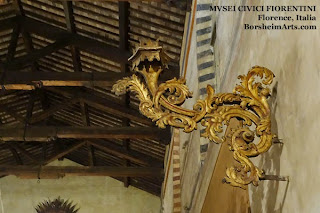Dear Art Lover,
After another delicious meal at the Osteria Santo Spirito on La Notte Bianca in Florence, I was
surprised to see a door open beside the Basilica
di Santo Spirito. In all the years
that I lived in that neighborhood, I had not seen that door open. [But to be fair, I am not often outside of
my home studio during the day.] So, my
friend and I ventured inside. The
museum, the MVSEI CIVICI FIORENTINI
to be exact, was free that night because of all of the festivities. And the staff did say that the building was
under restoration for about the time that I lived in the zona Santo Spirito.
This is the home of The Salvatore Romano
Foundation (Fondazione Salvatore Romano)
and the building is called the Old Santo Spirito Refectory. Salvatore Romano [1875-1955], an antiques
dealer who started off in Napoli (Naples), donated about 70 art objects, mostly
stone, for permanent exhibition here in Florence in the memory of his father.
Salvatore was the son of a ship owner and
sea captain. He went to Genoa to study naval
engineering and discovered his interest in art objects. He began to deal in violins after returning
to Naples and later brought them to Florence, the then favored city for museum
directors and foreign collectors. In the
early 1920s, he moved to Florence.
He branched out into all sorts of
antiques, but ended up favoring sculpture, particularly stone. He traveled widely throughout Italy to
acquire the objects from their places of origin and he became known for leaving
them as he found them, instead of restoring them. Many of his acquisitions are now housed in
important museums in Europe and America.
As you can see from my images of my visit,
there are many medieval stone pieces in this collection and by his will, they
must remain here. He even arranged most
of the pieces himself, as director of his own museum until his death. He is also entombed in the Refectory.
The building itself was constructed by the
Friars of Saint Augustine in the
latter half of the 13th century.
The friars ate their meals here and the building was somehow spared when
the church was destroyed by fire. It is believed to have fallen into disuse by
the 16th century and was rebuilt.
By the 19th century, there was a large hole in the wall
[today filled in], which explains the loss of the lower parts of the grand
fresco I show you in my images.
 |
| So, I ask you, "What is the man in the white plaster seeing?" |
 |
| Fresco by Andrea di Cione (Orcagna) and his brother Nardo |
This refectory and the one in Santa Croce
are the oldest Florentine refectories decorated with a Crucifiction scene, as
well as a scene of The Last Supper. The
Santo Spirito fresco was created by Andrea
di Cione, aka Orcagna, with his
brother Nardo. The dates are likely between 1360 and
1366. A coat of arms included in the
fresco tell us that the family of Cambi
di Napoleone commissioned the work.
The Santo Spirito complex became a part of
the Italian State in 1866 and the refectory was given to the city of Florence. In 1894, the sculptor Raffaello Romanelli leased the space to house his plaster models
and used it as a workshop. After he
died, the idea of a museum was born. The
fresco was restored by Amedeo Benini
and his sons. Restoration of the
refectory started in 1936 and ended sometime between 1941 and 1944. It surprised me to read that since Florence
was bombed a lot by the Germans during WWII.
Romanelli Studios still exist on nearby Borgo
San Frediano. The artist’s plaster
models were removed from the Refectory to make space for the collection of
Salvatore Romano. Enjoy!
Happy Birthay, John B!
Peace,Kelly
~ Kelly Borsheim, sculptor,
painter, writer, teacher











2 comments:
Thanks for the excellent free Tour in words and photos! I noted the expressive stone portrait with your hand at base. Gene P.
Haha.. that hand is only for a size understanding. I am sure that funny face was originally intended to be seen at the top of a column or corner of a ceiling. See the tilt on it? As if he is looking down.
Thanks,
Kelly
Post a Comment